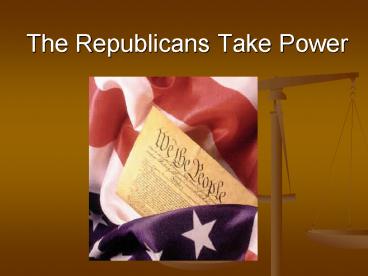The Republicans Take Power - PowerPoint PPT Presentation
1 / 18
Title:
The Republicans Take Power
Description:
The Republicans Take Power Election of 1800 Federalists John Adams V.P.- Charles Pinckney Election of 1800 Republicans Thomas Jefferson ... – PowerPoint PPT presentation
Number of Views:111
Avg rating:3.0/5.0
Title: The Republicans Take Power
1
The Republicans Take Power
2
Election of 1800
Federalists
John Adams V.P.-
Charles Pinckney
3
Election of 1800
Republicans
Thomas Jefferson V.P - Aaron Burr
4
The Campaign
- Neither candidate traveled the country making
speeches about why he should be elected. - The candidates wrote letters to leading citizens
and newspapers proclaiming their views.
5
(No Transcript)
6
Election Deadlock
- When the members of the electoral college voted,
Jefferson and Burr each received 73 votes. This
tied the two candidates. It was up to the House
of Representatives to break the tie. Alexander
Hamilton urged one Federalist to vote for
Jefferson
- In 1800 the candidate who received the
second-highest number of votes (no matter the
party of the winner) in the electoral system won
the vice presidency.
7
The Aftermath
- Congress understood that the electoral process
needed some changes. In 1804 they passed the
12th amendment to the constitution. Instead of
having a first and second place method to
electing the president, electors now cast
separate ballots electing a president and a
vice-president.
8
President Jefferson
- Inaugurated March 4th, 1801.
- Jefferson believed in reducing the power and size
of the federal government. These ideas were
similar to the French philosophy of
laissez-faire, which means let the people do as
they please.
9
Jeffersons Policies
- Jefferson believed the strength of the U.S. was
its independent farmers. - He believed as long as most people owned their
own property they would fight to protect their
rights and to preserve the Republic. For this
reason he favored expanding the nation Westward. - He also believed the government should be kept
small.
10
Jeffersons Cabinet
- Secretary of State James Madison.
- Secretary of Treasury Albert Gallatin.
- They allowed the Alien and Sedition Acts to
expire and repealed the Naturalization Act.
11
Cutting Costs
- Jefferson and Gallatin aimed to reduce the
national debt. They cut costs by scaling down
military expenses. - Government funds would come from customs duties,
which are taxes on foreign imported goods, and
from the sale of western lands. - In Jeffersons view the government should be
limited to delivering the mail, collecting
customs duties, and conducting a census every 10
years.
12
Jefferson and the Courts
- Before Jefferson took office the Judiciary Act of
1801 was passed. It set up regional courts for
the U.S. with 16 judges and many other officials. - Federalist John Marshall was named Chief Justice
by John Adams. - Midnight judges last minute appointments.
- One commission not delivered was for William
Marbury. Jefferson told Madison not to deliver
it.
13
Marbury v. Madison
- To force delivery Marbury took his case to the
Supreme Court. Marshall turned down Marburys
claim. He noted that the constitution did not
give the Court jurisdiction to decide the case.
14
John Marshall
- Three principles of Judicial Review.
- The Constitution is the supreme law of the land.
- When there is a conflict between the Constitution
and any other law, the Constitution must be
followed. - The Judicial branch has a duty to uphold the
Constitution. It must be able to determine when
a federal law conflicts with the Constitution and
to nullify, or cancel, unconstitutional laws.
15
The Louisiana Purchase
- Americans moved west for land and adventure.
- In 1800, the territory of the U.S. extended only
as far as the Mississippi River. The area west of
the river was known as the Louisiana Territory
and belonged to Spain. - 1n 1802, Spain changed their policy of allowing
Americans to use the Mississippi River and the
port of New Orleans_. They made a secret
agreement to transfer that land to _France. - Napolean Bonaparte was the new leader of France.
16
- In 1803, Napoleon agreed to sale the entire
Louisiana Territory to the United States for
__15_ million dollars. This purchase doubled the
size of the US and made the Rocky Mountains the
new border. - Jefferson persuaded Congress to send an
expedition to explore the new territory. He chose
Meriwether Lewis to head the expedition. The
co-leader was William Clark. The expedition left
St. Louis, Missouri in the spring of 1804. A
young Shoshone woman named Sacagawea joined their
group as a guide. After 18 months and nearly
4,000 miles they reached the Pacific Ocean.
17
- Lewis and Clark returned in September 1806. They
collected valuable information on people, plants,
animals and the geography of the west. It also
opened up a way of trade and settlement for the
new nation and gave the US a strong claim to the
Oregon country.
18
- Federalists opposed the Louisiana Purchase
because they feared any new states made from it
would become Democratic-Republican. They plotted
to secede from the Union. They turned to Aaron
Burr for support. When Alexander Hamilton
accused Burr of plotting treason, - Aaron Burr challenged Hamilton to a duel.
Hamilton was seriously wounded and died the next
day.































